In the intricacies of our daily lives, we often find ourselves navigating a complex web of social interactions. Manners, the unspoken rules that govern these interactions, serve as the lubricant that keeps the gears of society running smoothly.This article aims to shed light on those subtle yet significant breaches of etiquette that may be lurking in our behavior, going unnoticed but potentially affecting our relationships and the way we are perceived.
1. Being A Picky Eater Is A NO GO In Restaurants
We can all be picky when we don't feel like eating something, but when you've been invited out to a restaurant, the last thing you want to be doing is turning your nose up at what's on the menu. The polite thing to do is to just keep your opinions to yourself, especially if someone else is paying for your meal.Original content sourced from Femanin.com

imagesource/youtubePolitely refraining from openly expressing displeasure with menu choices is not merely a matter of taste; it's a demonstration of respect for the host and an acknowledgment of the effort they've put into the dining experience. After all, it's a communal affair, fostering connections and shared moments.
2. Announcing That You're Going To The Toilet
If you're at a restaurant, you don't want to be letting everybody know your toilet habits. Etiquette expert, Lisa Grotts says. If you excuse yourself,
“announcing where you are going during a meal, such as to the bathroom or to make a phone call, is uncouth,” All you need to say is "excuse me" and get up.

imagesource/twitterThe discreet act of excusing oneself is an art in itself, and Grotts advises that simplicity and brevity are key. Instead of turning a routine trip to the bathroom or a quick phone call into a public announcement, a polite "excuse me" suffices, allowing for a graceful exit without unnecessary elaboration.
3. Gossiping Is NOT Pretty
Always resist the urge to gossip, even if it's about something really juicy. Grotts says,
“Gossiping about others is toxic behavior,” so if you're at a dinner table, or at someone's house, keep your gossip to yourself. It's not nice and nobody likes to hear that they've been gossiped about.

imagesource/twitterNot only does gossiping tarnish the atmosphere of conviviality, but it also inflicts potential harm by spreading unverified information. Acknowledging the emotional toll it takes on those unwittingly thrust into the spotlight of gossip, Grotts advocates for the virtue of discretion.
4. Slicing & Dicing Your Food
“Cutting all foods on your plate at once is a food crime,” she says. “The rule is one piece at a time. You’re an adult, not a baby.” says Grotts. Unless you're a child, you should not be cutting all of your food up before you've eaten it. Plenty of people do it still and it's definitely not dinner table etiquette.

imagesource/Love that MaxThe cardinal rule, according to her, is to savor one piece at a time, as befitting an adult rather than a child. This rule not only upholds a semblance of sophistication but also contributes to the overall harmony of the dining experience. Grotts' guidance shines a light on the subtle intricacies of dining decorum.
5. Passing Food To The Left
I bet you didn't think this would be something that was bad etiquette, but it is! If you're at a large table where food needs to be passed, you should be passing it to the right - counter clockwise. Grotts explains it:
“People are [generally] right-handed; therefore, we go counter-clockwise. That way they hold the plate with their left hand and serve with the right.” 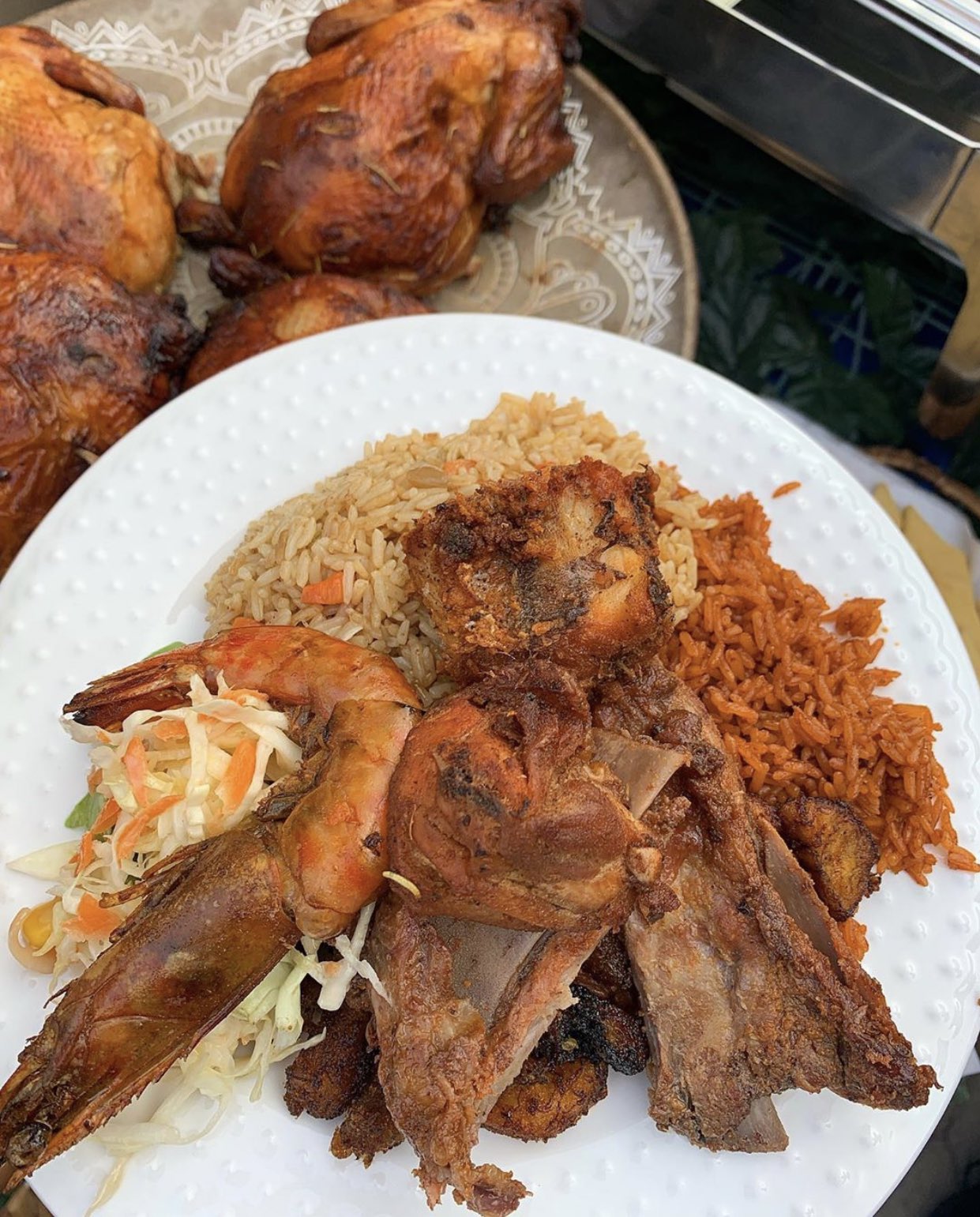
imagesource/twitterThis small but thoughtful detail not only streamlines the process of passing dishes but also ensures a smooth and efficient flow of food around the table. The unspoken etiquette of passing to the right goes beyond a mere formality; it reflects an understanding of fellow diners.
6. Passing The Salt & Pepper
“Salt and pepper are always passed together, just in case someone five seats away wants both,” Grotts says. When you hand the salt or pepper, you should be handing both according to proper etiquette. Pick both of them up and hand them to the person, even if they only asked for one.
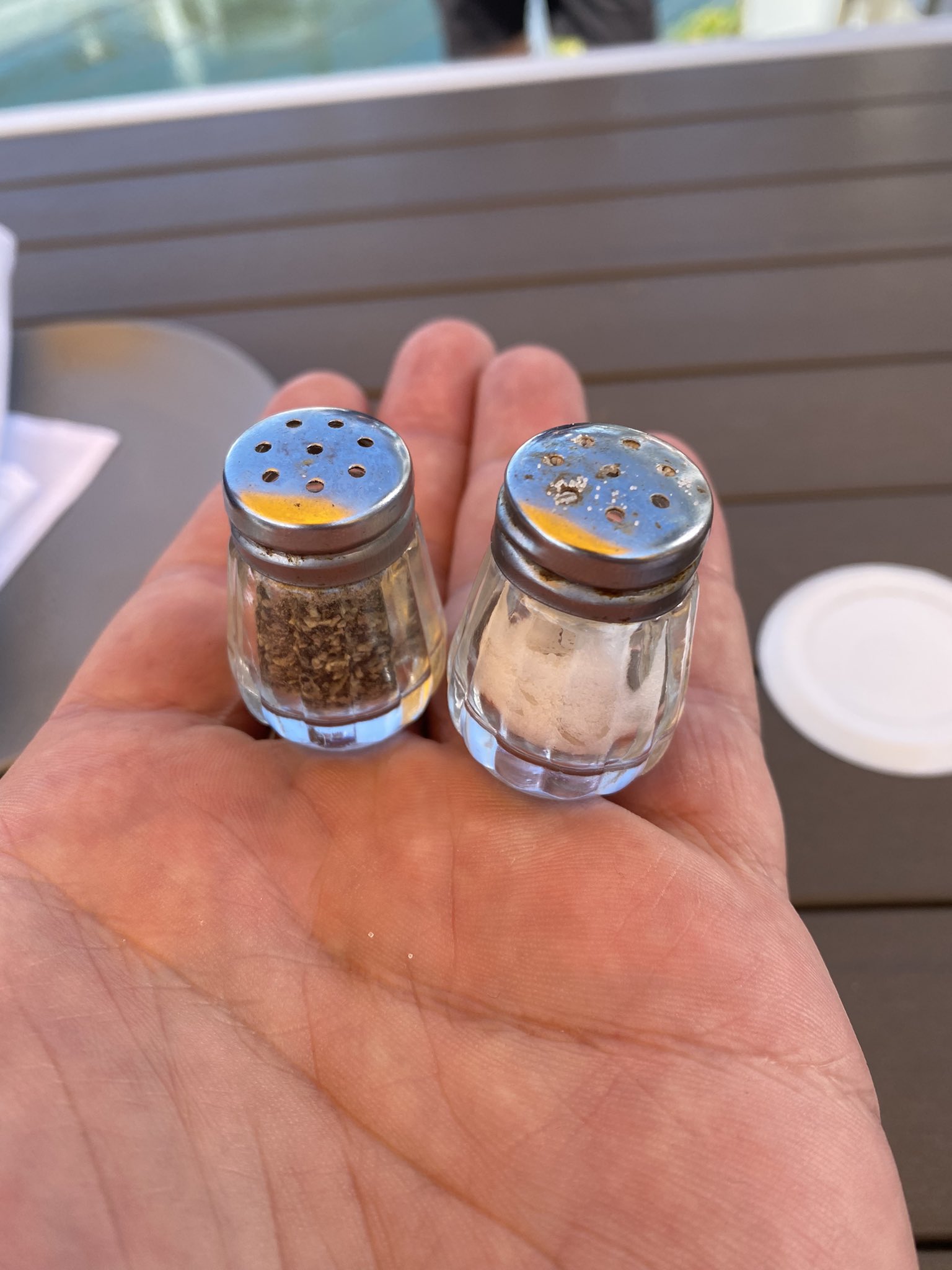
imagesource/twitterBy offering both salt and pepper together, individuals contribute to the smooth and considerate flow of the dining table, eliminating the need for a separate request if another diner wishes to season their dish with both condiments and not only just one!
7. Opening Your Hostess Gifts While The Guest Is Still There
So, most people already know that when invited to a house or a party, that they should bring a gift. But you should never expect it to be opened there and then. For instance,
“bringing a bottle of wine as a hostess gift and then expecting it to be opened during the party because it’s your favorite vintage,” explains etiquette expert Lisa Grotts.
“It’s a gift—not a gift to yourself!” 
imagesource/redditEmphasizing that a gift is intended for the recipient, this etiquette guideline encourages a gracious and unburdened reception of gifts, allowing hosts the freedom to decide when and how to incorporate the offerings into the event or save them for later.
8. Using Titles When Introducing Yourself
“It’s poor etiquette to disregard rank in introductions,” Grotts says.
“If someone has a title—think doctor, U.S. senator, admiral—then use it; they earned it.” You should never be introducing yourself using your formal title. But if someone uses theirs, use it back!

imagesource/businessinsiderDisregarding such titles during introductions is considered poor etiquette, as it overlooks the significance of the individual's achievements. The use of formal titles becomes a gesture of respect and recognition, creating an environment that values the accomplishments of each person.
9. Drinking In Your Own Toast
I think we're all guilty of this and this is a weird one, because whats the point in doing a toast when you can't drink your own drink? This is technically classed as a breach in etiquette, so if you're ever doing a toast at a meal or something, keep this one in mind!

imagesource/ape to gentlemanRefraining from sipping your own drink during a toast might be perceived as a disengagement from the communal spirit of the moment. It's a social tradition that carries an unspoken expectation: if you propose or participate in a toast, it's customary to take a sip of your own beverage.
10. Talking On Your Phone In Public Places
Sometimes you have to take a phone call, it can't be helped! But when you're in a busy , public spot, like a train carriage, then do try to hold it in...that's what texting is good for!
“[It’s] disruptive and rude to the person serving you and others in line,” Grotts says.

imagesource/redditIn the evolving landscape of digital communication, it's important to adapt our behavior to the social dynamics of shared spaces. So, the next time you find yourself in a bustling train carriage or a crowded public place, consider the impact of your phone call on those around you
11. Using Speakerphone In Public
Another rude thing to do is using your speaker phone in public. “Never keep your mobile phone on speaker while in public,” Grotts says. If you need to have a conversation with someone on the phone, nobody else should be able to listen into what you're saying to each other.

imagesource/ifunnyIn a world where personal conversations often take place on the go, being mindful of the impact of speakerphone use contributes to a more considerate and respectful public environment. So, the next time you find yourself reaching for the phone in a crowded place, keep it private!
12. Using Too Much Perfume
This is one of those where 'less is more'. Try not to be too heavy handed when it comes to spraying your favourite perfume, just because you like the smell of it, doesn't mean everyone else has to be able to smell it too. Do a perfume check before you leave the house.

imagesource/twitterConsideration for others should guide the application of fragrance. A quick perfume check before leaving the house becomes an essential step in ensuring that your olfactory expression remains a personal pleasure rather than an unintended imposition.
13. Not Replying To Your RSVP
Nowadays we don't really do the posting your RSVP off, but think Facebook or text chains. Either way, RSVP, especially if you can't make it. Leaving your host hanging in a state of uncertainty about your attendance is considered a breach of etiquette, regardless of the medium through which the invitation was extended.

imagesource/redditA prompt and thoughtful RSVP, even if it's regretfully declining the invitation, showcases a level of maturity and respect for the time and energy invested by the host. It contributes to the smooth organization of the event, allowing hosts to focus on creating an enjoyable experience for those attending.
14. Boasting
“You have just received a promotion or purchased a yacht, but your friend might be unemployed and doesn’t even have a car,” Grotts says.
“Good for you, but be humble about it.” This is a given really, no one likes someone who just constantly boasts about themselves. If you've been to Tenerife, they've been to Elevenerife!

imagesource/nationalworldSo, whether reveling in success or enjoying the fruits of personal endeavors, the lesson is clear: let your achievements speak for themselves, and be mindful of the diverse paths and challenges that define the experiences of those around you and try not to boast.
15. Eating Too Fast
Sometimes it just can't be helped can it! But when you're starving, you should try not to shovel your food in your mouth at lightening speeds. When you've finished with your food, you should put your cutlery side by side so it points to where the number 11 would be on a clock face.

imagesource/twitterThis small act serves as a non-verbal signal to others that you have finished eating. It not only communicates your readiness for the next course or the conclusion of the meal but also contributes to the overall aesthetics and orderliness of the dining setting.
16. Putting Your Bag On The Table
This also includes your cell phone, purse, wallet, you name it. Your belongings should not be in the table, as leaving them there creates a cramped table, with less space to place the food. You could also make the server's job a little harder by having your things on the table.

imagesource/the vintage barPlacing personal items such as cell phones, purses, or wallets on the dining table is cautioned against, and for good reason. This practice not only diminishes the available space for food and table settings but can also complicate the server's task of efficiently serving and clearing dishes.
17. Eating The Wrong Bread
When you're at a busy table, it can sometimes be a little confusing, with who's plate is who's etc. Remember the saying though, "liquids on the right, solids on the left" and that should help you remember which is yours when it comes to the bread on the table!
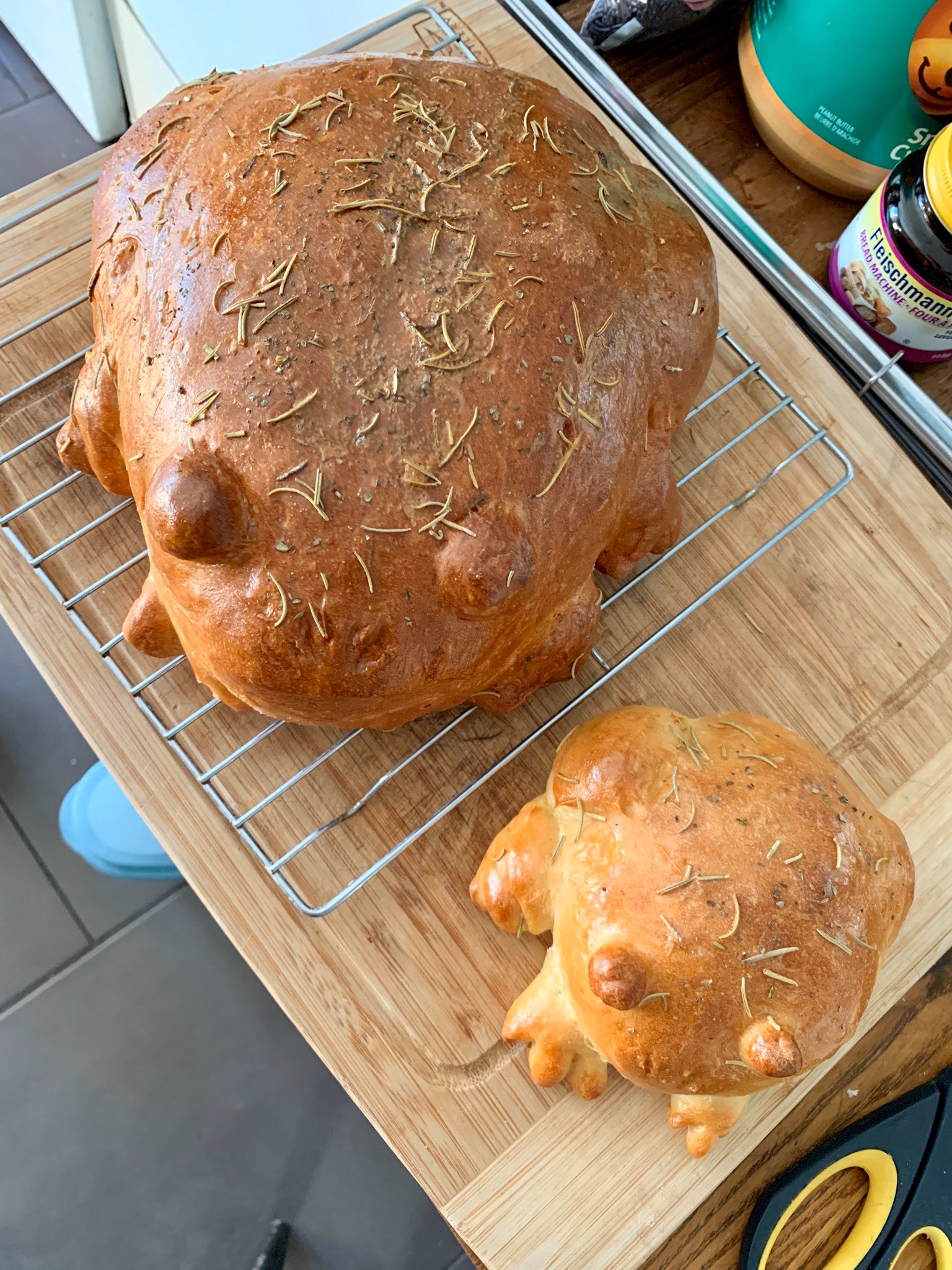
imagesource/twitterBy associating liquids with the right side and solids with the left, you can quickly determine which side of your place setting holds the bread plate. This handy tip not only aids in personalizing your dining experience but also contributes to the overall orderliness and efficiency of the meal.
18. Spitting Out The Pits
You've bitten into one of the olives that have been placed on the table, so what do you do? There shouldn't be any spitting out onto the plate, it should be spat into your hands and onto the side of your plate discreetly if there isn't a little bowl or plate already for the pits.
:max_bytes(150000):strip_icc()/OlivestoPit-5987c8ff9abed50010656555.jpg)
imagesource/thespruceeatsThis approach minimizes any visual disruption to the dining experience and maintains a level of decorum at the table. This nuanced guidance highlights the importance of maintaining a level of discretion and thoughtfulness during shared meals with other diners.
19. Using The Wrong Napkin
If the napkin is not placed directly on your plate, yours can be found to the left of you. You just need to place it neatly on your lap once everyone has been seated. If you're in a nice restaurant, always avoid eating or drinking before you have a napkin on your knee.
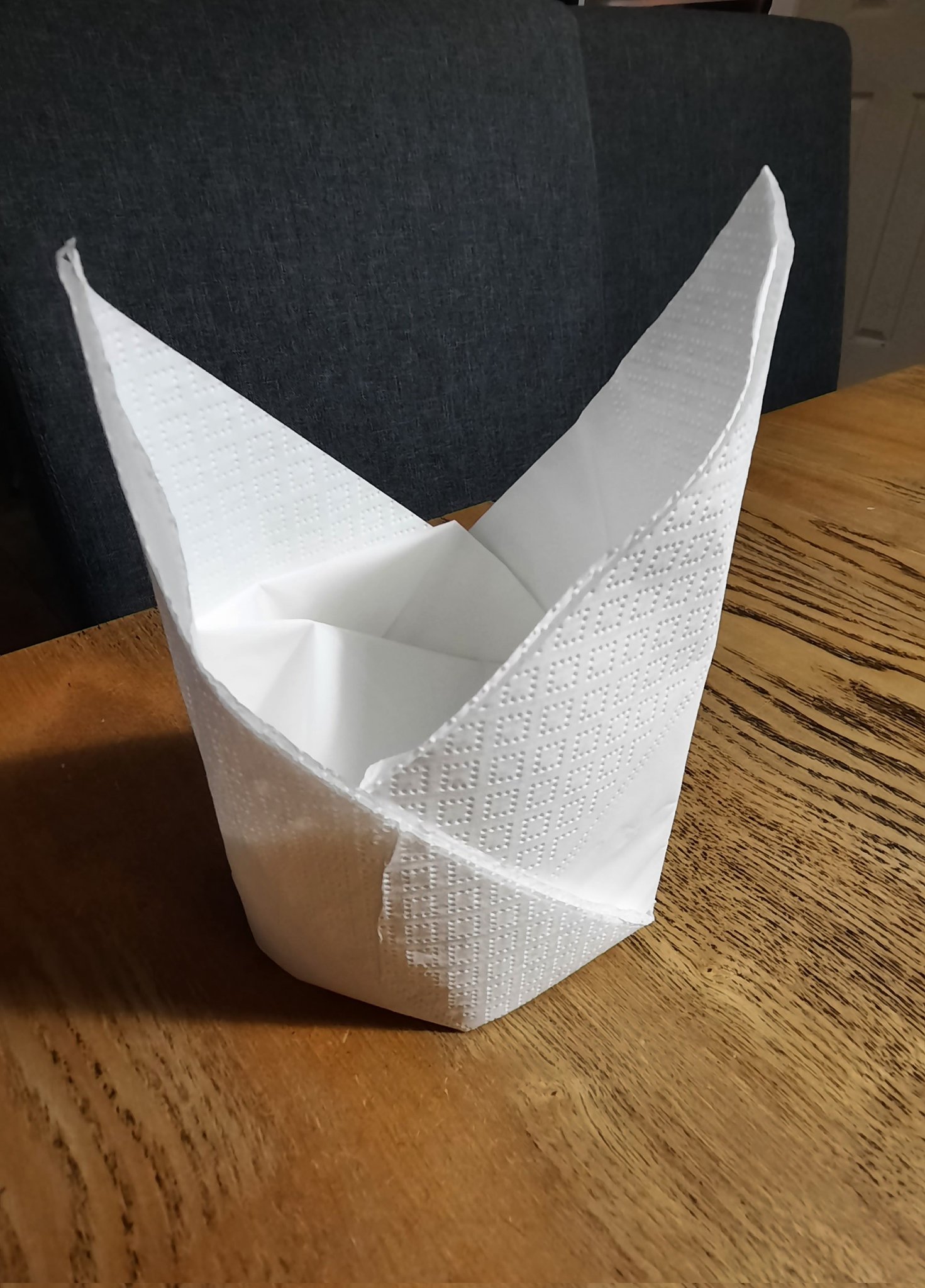
imagesource/twitterBy adhering to these practices, diners not only demonstrate their familiarity with dining etiquette but also show respect for the established norms of the particular dining environment. It adds an element of sophistication to the meal and ensures that everyone is in sync.
20. Eating Right Away
No matter how hungry you are, you should always wait for everyone's food to arrive and wait for everyone to be ready to tuck in before you yourself begin eating. Your host should be seated if you're at somebodies house and everyone should be served, including them.

imagesource/twitterThe practice of waiting for all diners to be ready underscores the communal nature of dining—a shared experience that extends beyond the mere consumption of food. By synchronizing the start of the meal, individuals contribute to the creation of a harmonious dining atmosphere.
21. Talking With Your Mouth Full
When you're at restaurant, one of the hardest things to do, is to not talk with your mouth full. When someone asks you a question, finish your bite of food and then speak. If you've got a mouth full of food, give them a smile, gesture that your mouths full and then start the conversation once swallowed.

imagesource/redditThis practice not only demonstrates respect for the conversational partner but also ensures that your responses are clear and easily understood. Interrupting a meal with a mouth full of food can be both unappetizing and challenging for those trying to follow the conversation.
22. Trying To Eat Too Much In One Bite
We've all been there, it's so easy to do when you're absolutely starving hungry. But rather than shovel a load of food in your mouth, take smaller bites that fit comfortably in your mouth and you'll find it easier to chew your food without getting those hamster cheeks.
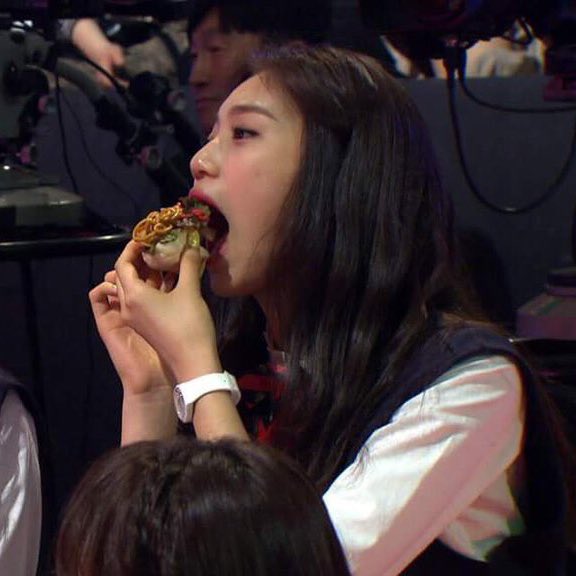
imagesource/twitterTaking smaller bites allows for a more controlled and pleasurable eating experience, preventing the need to contend with the discomfort of "hamster cheeks" or an overstuffed mouth. Beyond the physical aspect, the art of taking smaller bites aligns with the broader concept of mindful eating.
23. Eating Shellfish Wrong
If you're not sure how to eat shellfish, like Oysters, then ask somebody who knows how to! Oysters are meant to be picked up and slurped down (without making a sound obviously). Mussels can be eaten by putting a fork in and being pulled out. Lobster is probably the trickiest but also tastiest, so you know, it's worth it!

imagesource/redditThe snap of a shell, the aroma of the sea, and the rich, varied tastes all contribute to an experience that transcends the act of eating. So, whether you approach it with the precision of an oyster aficionado or the unbridled enthusiasm of a first-timer, each encounter with shellfish promises a unique and memorable adventure.
24. Passing Food The Wrong Way
When you're eating at a large table and food needs to passed around, there is a correct direction to do it in. You don't pass the food across the table, but pass it to the right or you can just designate one person to serve everyone. This method avoids any confusion and ensures a smooth flow of dishes around the table.
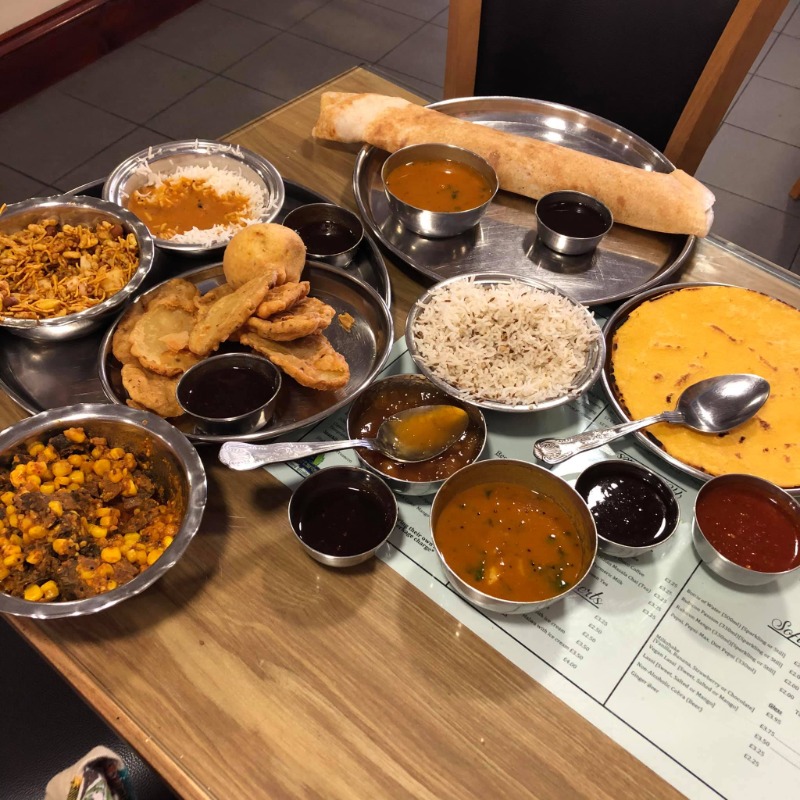
imagesource/twitterDesignating a specific person to serve can also be a practical and elegant solution. This appointed "server" takes on the responsibility of distributing the portions, reducing the potential for reaching across others or causing disruptions in the conversation.
25. Cutting Steak Or Other Meats All At Once
Unless you're cutting meat up for your child, you shouldn't cut up the piece of meat all at once. It's seen to be impolite and rude. When you have a piece of steak, you just cut it bite by bite. It seems like something really simple, but a lot of people just go in full force.
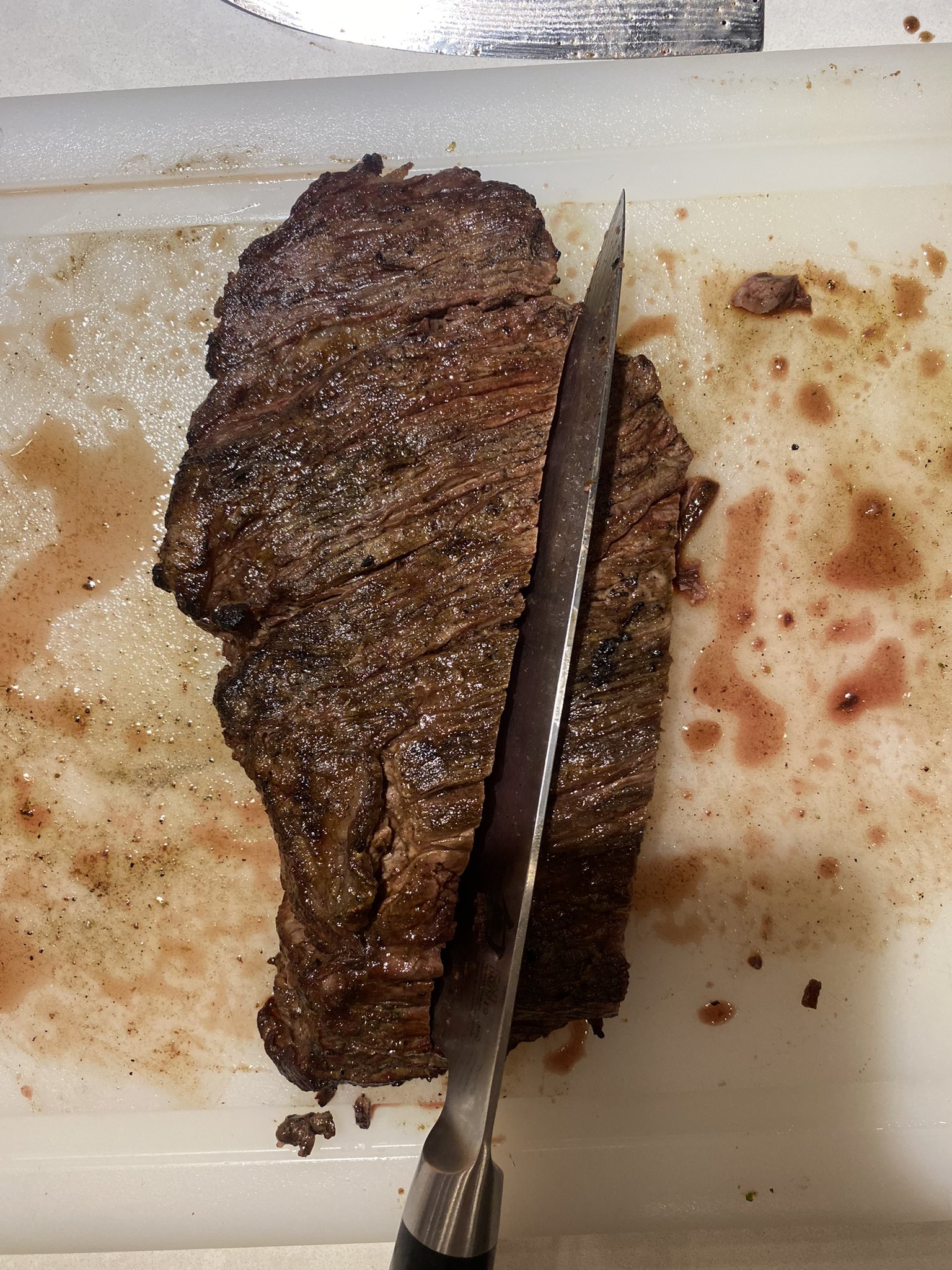
imagesource/twitterIt may convey a lack of patience or even disrupt the flow of the meal, especially in more formal settings. Taking it bite by bite not only allows for a more gradual and enjoyable eating experience but also ensures that the food remains warm and fresh.
26. Licking Your Fingers
This one surely is a major no-no for everyone. Yes, everyone likes to lick their fingers after a tasty chicken wing or two, but stop yourself from doing that when you're around people or at a restaurant. Excuse yourself and go wash your hands in the bathroom.

imagesource/twitter
27. Stacking The Dishes At The End Of The Meal
When you're at a restaurant and you're all finished with your food, you might think you're being polite and helping the waiting staff by stacking your plates. But restaurants have a system in place for clearing tables so just be patient and let them do their jobs correctly.

imagesource/the daily dotPatience is indeed a virtue in this situation. If you want to express appreciation for the service, a simple thank-you or a nod of acknowledgment when they come to clear the table is a courteous way to show gratitude without potentially complicating their tasks.
28. Dropping Cutlery
It's one of those things that just can't be helped but if you find yourself at a restaurant and your drop your cutlery, just call over one of the servers and they will grab you a new one without you having to fish around for yours. Avoid trying to retrieve fallen cutlery yourself, especially if it has fallen onto the floor.
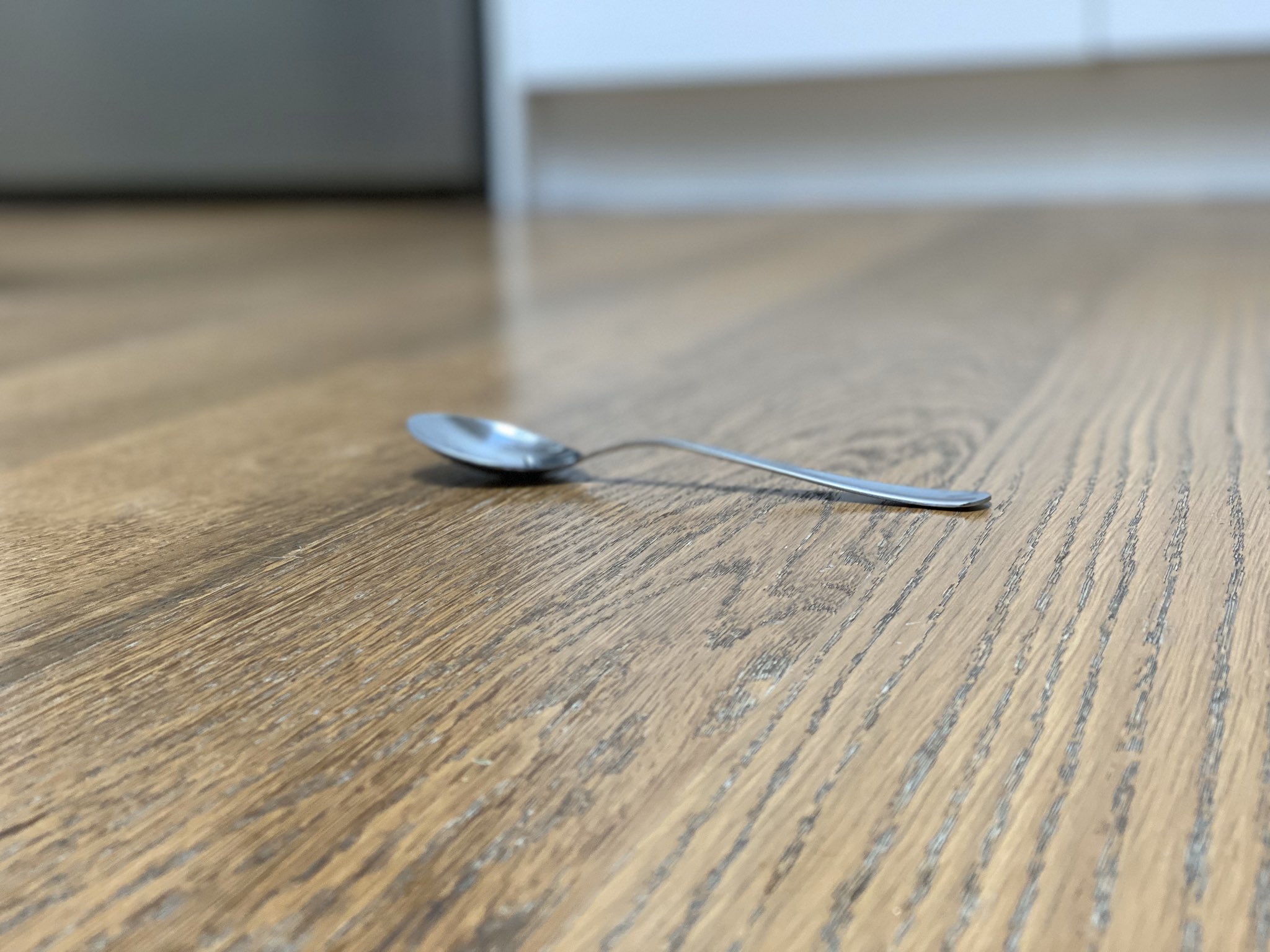
imagesource/twitterServers are equipped to handle such situations with the proper tools and sanitation measures to maintain cleanliness and hygiene standards. It's a simple and effective way to address the issue without causing any inconvenience to yourself or those around you.
29. Blowing Your Nose
Even if you're feeling under the weather, you really should not blow your nose at the table, it disturbs everyone around you, it's loud and it's a bit gross. Take yourself to the bathroom and get all of that congestion out of your nose, alone, away from everyone else.

imagesource/RVCJ mediaNot only does this show respect for your fellow diners, but it also helps maintain a more comfortable and hygienic environment at the table. A quick visit to the restroom allows you to address personal matters discreetly, ensuring that others can enjoy their meals.
30. Adding Salt Before Tasting
We're all guilty of this, but, before you grab the salt shaker, you must taste test your food first. It's insulting to the chef and it makes you look rude to the people around you. Seasoning your food before tasting it is absolutely essential both out and about, as well as at someone's house.

imagesource/NBC newsIn a restaurant setting, chefs carefully craft dishes to achieve a specific flavor profile, and adding salt before tasting might alter that intended balance. Similarly, when dining at someone's home, it's courteous to first taste the food as prepared before adjusting the seasoning to personal preference.
31. Laughing With Your Mouth Open
You might think those natural laughs where you throw your head back, snort and cackle are the best kind because they're natural and you're not trying to cover your face. But in Japan, it's considered impolite if you laugh with your mouth hanging wide open.

imagesource/redditThey usually prefer it if you cover your mouth with your hand when you laugh! It's a great example of how gestures that might seem universally natural or innocent can carry different connotations in various cultural settings. Being aware of and respecting such cultural nuances is essential!
32. Giving A Thumbs Up
We all do this, on a daily basis, right? Well, you might want to be careful where you're doing it... because in some places in the world (Greece, South America and the Middle East) it's considered the same as if you'd given someone the middle finger.

imagesource/redditSo you can imagine how well that would go down. You might want to just try smiling your thanks instead... When in doubt, it's always a good idea to observe and follow the local customs to navigate social interactions smoothly and avoid sticking your thumbs up at dinner!
33. Using Condiments In Your Meals
In certain restaurants in the world, you shouldn't ask for a single thing to be changed about your meal - including the condiments you add to it - because it's considered bad taste. In France, Italy, Spain and Japan you should always eat the dish exactly as it's served to you.

imagesource/redditSo remember that before wanting to put a huge dollop of ketchup on the side of your fries. Chefs take pride in their creations, and altering the dish might be seen as questioning their expertise. Adapting to the local dining etiquette ensures a more authentic experience!
34. Sitting In The Back Of A Taxi
Wait, surely this is the done thing, right? Well, not in all places in the world, apparently. It's actually considered rude in some countries because it seems like you think you're better than the driver by sitting in the back as though they're chauffeuring you around...

imagesource/redditWhich, obviously they are doing, and you're paying for it, but it's more polite to sit in the front passenger seat on equal footing. It's a subtle way of showing respect and acknowledging the driver as more than just a service provider and it signifies a sense of equality and camaraderie.
35. Finishing Every Crumb Of Your Food
When your meal is delicious, of course you want to eat every last morsel of it and lick your plate clean. But in some cultures, clearing your plate completely is actually bad manners. The reason it's shown as discourteous is because if you completely clear your plate it suggests you're still hungry and trying to imply the host hasn't given you enough food.

imagesource/redditClearing your plate entirely might indeed be interpreted as a sign that you are still hungry and dissatisfied with the portion provided by the host. Cultural nuances like these highlight the importance of understanding local customs and practices, especially when it comes to shared activities like dining.
36. Showing The Bottom Of Your Feet
Think how many times you've been relaxing on the couch, or on a sunbed, with no shoes or socks on and displaying your bare feet to the world. You may want to rethink that. Because in some parts of the world, like Arab and Muslim cultures, the feet are considered the most dirty body part.

imagesource/redditFeet are seen as the part of the body that is in closest contact with the ground and, by extension, associated with impurity. Therefore, showing the soles of your feet, whether intentionally or not, may be considered offensive or impolite in these cultures.
37. Crossing Your Fingers
For most of us, crossing our fingers is a symbol of good luck. We might cross our fingers and tell someone we have our fingers crossed for them, or even cross our fingers behind our back if we lie, if you were brought up with that idea. But in Vietnam, crossed fingers are a symbol for the vagina!

imagesource/redditThis highlights the importance of cultural sensitivity and awareness, especially when engaging with gestures or symbols that might have different connotations in various regions. When navigating cross-cultural communication, it's always valuable to be open to learning about local customs to avoid unintended offense.
38. Eating In Public
Are you usually someone that grabs lunch on the go and sits on a park bench, or just stuffs their face during the commute or while walking the street? You might want to rethink that if you're going to Japan, because they consider it bad manners if you eat anywhere in public that isn't a restaurant.

imagesource/redditIt's common for people in Japan to consume food in designated areas like parks, where benches and tables are provided for such activities. Eating while walking or in other public spaces may be perceived as inconsiderate, as it goes against the cultural norm of maintaining a clean and orderly public space.
39. You Might Be Doing 'The Peace Sign' All Wrong
In countries like the UK, Australia and New Zealand, making a V-sign with your fingers with the back of your hand facing outwards is a sign of swearing at someone. The peace sign is acceptable if you're making it with your palm facing outward instead.

imagesource/redditSo make sure you're always doing the peace sign the right way or you might end up offending someone! Cultural differences in the interpretation of gestures highlight the need for awareness and sensitivity, especially when communicating in diverse settings.
40. Putting One Hand In Your Pocket
Bad news if you're a fan of Alanis Morissette and you have one hand in your pocket AND you're giving the peace sign. In both Turkey and South Korea, having one hand in one of your pockets will give off an air of arrogance and be particularly bad manners if you're talking to someone whilst doing it!

The act of putting one's hands in the pockets can convey a sense of informality, maintaining a more upright and attentive posture is often expected. In some cultural contexts, having one hand in the pocket might be associated with a perceived air of arrogance or dismissiveness.
41. Putting Your Hand Up To Get A Waiter's Attention
For most of us, this seems like the logical thing if it's a busy restaurant and the waiter hasn't been back to your table in a while. You might just want to give them a quick wave the next time they look your way. But in the US, this is bad manners - and even worse if you whistle at them or flap your hand around to call them over.

imagesource/redditYou should always wait to get their attention when they're walking right by you. It's generally considered impolite to wave, whistle, or make other gestures to get the attention of the waiter or waitress. Instead, the custom is to wait until they are naturally passing by your table, and then make eye contact.
42. Making That Metalhead Horn Sign With Your Fingers
How many times have you done this at a rock or metal concert, or at home when bopping to your own playlist? Well, in some countries of the world this means something completely different - and offensive. In places like Cuba and Brazil, if you show the horn hand symbol to a man, it tells them you think their wife is cheating!

imagesource/Ultimate GuitarIt has been a symbol of rock and rebellion since its popularization by musicians like Ronnie James Dio. In the context of concerts or among fans, it typically signifies a shared enthusiasm for the music. However, gestures can carry different meanings in various cultures, leading to potential misunderstandings.
43. Tipping Workers
For a lot of people, tipping customer service or hospitality workers means that you want to thank them for a job well done - or just automatically add a tip to the bill. But in Japan and South Korea, it's actually bad manners to give a tip - and borderline offensive.

imagesource/good news networkThis is because workers take pride in doing their job as they should, so anything else like a bonus or tip seems like you're giving them another reason to work hard when they don't need it. Offering a tip might be interpreted as implying that the worker needs extra motivation or is not adequately compensated.
44. Drinking A Coffee After Eating
In places like the UK, many people indulge in a coffee after a heavy meal at a restaurant in place of a dessert, but in Italy this is a huge no-no. So you might not want to order one the next time you go there, even though Italy is known for its great coffee.

imagesource/redditThis is because Italians believe milky coffees like cappuccino can cause indigestion after eating, so it might not be the best idea. Ordering a cappuccino after a meal might be perceived as unusual and, in some cases, contrary to the local dining norms.
45. Using Your Left Hand
This may come as a surprise, especially if you're left-handed and you don't usually have much choice. But you're going to have to think more carefully about using your right hand in a lot of Asian, African or Middle Eastern countries, because the left hand is seen as bad manners - such as eating with your left hand.

imagesource/redditIn these regions, cultural norms and etiquette play a significant role in daily interactions, including dining practices. Using the right hand for greetings, eating, and other social activities is a way of showing respect and adhering to cultural traditions.
46. Saying No To Food
It's rare this happens because let's face it, who's going to say no to extra food? But that moment when you know you simply couldn't stuff your face anymore and you have to say no to dessert would be very bad manners in Arab countries. It's seen as an insult if you reject the hard-earned food that they put on the table.

imagesource/redditPolitely refusing food may be perceived as a rejection of the host's generosity and efforts to provide a delightful dining experience. In Arab cultures, it's generally encouraged to accept food offerings graciously and express appreciation...even if you feel super full.
47. Not Saying 'No' The First Time Someone Tries To Offer You Something
We've all been there - someone offers us something, like to pay for dinner or to buy us a drink, and we pretend to be modest or polite at first by saying 'no' even though we really want it. But it's actually very bad manners if you immediately say yes to a gift or offer in China and Japan - you're supposed to say no a few times first.

imagesource/yellow blogtopusThe process often involves the giver persisting with their offer, and the recipient may continue to decline a few times before ultimately accepting. This ritual demonstrates humility on the part of the recipient and sincerity on the part of the giver.
48. Opening A Gift Straight Away
Just like when you were a child on Christmas morning and you start tearing into your presents straight away - is there anything more fun than ripping open a gift in excitement? Well, actually, it's pretty bad manners in Asian countries, as it can be seen as particularly greedy if you can't wait to open a gift straight away.

imagesource/redditRipping open a gift immediately upon receiving it might be perceived as impolite or even greedy in these cultural contexts. Taking a moment to acknowledge the gift-giver, express thanks, and then opening the gift at a more appropriate time is often more aligned with local customs.
49. Biting Into A Baguette
Or, cutting into a baguette. Which sounds silly because that's what most people do, right? Cut into a big baguette with a bread knife to make some slices. But cutting or biting directly into a baguette is a huge no-no in France. It's bad manners if you don't break bread.

imagesource/DMARGEIn French dining etiquette, there is a traditional way of handling and serving bread, especially baguettes. Breaking bread is a symbolic and respectful gesture in France. Instead of cutting slices directly with a knife, it's customary to tear off a piece of the baguette with your hands.
50. Showing Up Early - Or On Time
This one is for those with social anxiety who arrive to a party at least an hour early just to make sure there's a parking space. But in Venezuela in particular, it's very bad manners if you're not late. You should be a tiny bit late, like 10 to 15 minutes, because if you're early it's a sign of 'greediness' and being overly eager!

imagesource/redditArriving fashionably late, typically around 10 to 15 minutes, is often considered polite and respectful. Being excessively early might be interpreted as eagerness or impatience, which can potentially make other people feel unintentionally rushed or uncomfortable.
 imagesource/youtubePolitely refraining from openly expressing displeasure with menu choices is not merely a matter of taste; it's a demonstration of respect for the host and an acknowledgment of the effort they've put into the dining experience. After all, it's a communal affair, fostering connections and shared moments.
imagesource/youtubePolitely refraining from openly expressing displeasure with menu choices is not merely a matter of taste; it's a demonstration of respect for the host and an acknowledgment of the effort they've put into the dining experience. After all, it's a communal affair, fostering connections and shared moments. imagesource/twitterThe discreet act of excusing oneself is an art in itself, and Grotts advises that simplicity and brevity are key. Instead of turning a routine trip to the bathroom or a quick phone call into a public announcement, a polite "excuse me" suffices, allowing for a graceful exit without unnecessary elaboration.
imagesource/twitterThe discreet act of excusing oneself is an art in itself, and Grotts advises that simplicity and brevity are key. Instead of turning a routine trip to the bathroom or a quick phone call into a public announcement, a polite "excuse me" suffices, allowing for a graceful exit without unnecessary elaboration. imagesource/twitterNot only does gossiping tarnish the atmosphere of conviviality, but it also inflicts potential harm by spreading unverified information. Acknowledging the emotional toll it takes on those unwittingly thrust into the spotlight of gossip, Grotts advocates for the virtue of discretion.
imagesource/twitterNot only does gossiping tarnish the atmosphere of conviviality, but it also inflicts potential harm by spreading unverified information. Acknowledging the emotional toll it takes on those unwittingly thrust into the spotlight of gossip, Grotts advocates for the virtue of discretion. imagesource/Love that MaxThe cardinal rule, according to her, is to savor one piece at a time, as befitting an adult rather than a child. This rule not only upholds a semblance of sophistication but also contributes to the overall harmony of the dining experience. Grotts' guidance shines a light on the subtle intricacies of dining decorum.
imagesource/Love that MaxThe cardinal rule, according to her, is to savor one piece at a time, as befitting an adult rather than a child. This rule not only upholds a semblance of sophistication but also contributes to the overall harmony of the dining experience. Grotts' guidance shines a light on the subtle intricacies of dining decorum. imagesource/twitterThis small but thoughtful detail not only streamlines the process of passing dishes but also ensures a smooth and efficient flow of food around the table. The unspoken etiquette of passing to the right goes beyond a mere formality; it reflects an understanding of fellow diners.
imagesource/twitterThis small but thoughtful detail not only streamlines the process of passing dishes but also ensures a smooth and efficient flow of food around the table. The unspoken etiquette of passing to the right goes beyond a mere formality; it reflects an understanding of fellow diners. imagesource/twitterBy offering both salt and pepper together, individuals contribute to the smooth and considerate flow of the dining table, eliminating the need for a separate request if another diner wishes to season their dish with both condiments and not only just one!
imagesource/twitterBy offering both salt and pepper together, individuals contribute to the smooth and considerate flow of the dining table, eliminating the need for a separate request if another diner wishes to season their dish with both condiments and not only just one! imagesource/redditEmphasizing that a gift is intended for the recipient, this etiquette guideline encourages a gracious and unburdened reception of gifts, allowing hosts the freedom to decide when and how to incorporate the offerings into the event or save them for later.
imagesource/redditEmphasizing that a gift is intended for the recipient, this etiquette guideline encourages a gracious and unburdened reception of gifts, allowing hosts the freedom to decide when and how to incorporate the offerings into the event or save them for later. imagesource/ape to gentlemanRefraining from sipping your own drink during a toast might be perceived as a disengagement from the communal spirit of the moment. It's a social tradition that carries an unspoken expectation: if you propose or participate in a toast, it's customary to take a sip of your own beverage.
imagesource/ape to gentlemanRefraining from sipping your own drink during a toast might be perceived as a disengagement from the communal spirit of the moment. It's a social tradition that carries an unspoken expectation: if you propose or participate in a toast, it's customary to take a sip of your own beverage. imagesource/redditIn the evolving landscape of digital communication, it's important to adapt our behavior to the social dynamics of shared spaces. So, the next time you find yourself in a bustling train carriage or a crowded public place, consider the impact of your phone call on those around you
imagesource/redditIn the evolving landscape of digital communication, it's important to adapt our behavior to the social dynamics of shared spaces. So, the next time you find yourself in a bustling train carriage or a crowded public place, consider the impact of your phone call on those around you imagesource/ifunnyIn a world where personal conversations often take place on the go, being mindful of the impact of speakerphone use contributes to a more considerate and respectful public environment. So, the next time you find yourself reaching for the phone in a crowded place, keep it private!
imagesource/ifunnyIn a world where personal conversations often take place on the go, being mindful of the impact of speakerphone use contributes to a more considerate and respectful public environment. So, the next time you find yourself reaching for the phone in a crowded place, keep it private! imagesource/twitterConsideration for others should guide the application of fragrance. A quick perfume check before leaving the house becomes an essential step in ensuring that your olfactory expression remains a personal pleasure rather than an unintended imposition.
imagesource/twitterConsideration for others should guide the application of fragrance. A quick perfume check before leaving the house becomes an essential step in ensuring that your olfactory expression remains a personal pleasure rather than an unintended imposition. imagesource/redditA prompt and thoughtful RSVP, even if it's regretfully declining the invitation, showcases a level of maturity and respect for the time and energy invested by the host. It contributes to the smooth organization of the event, allowing hosts to focus on creating an enjoyable experience for those attending.
imagesource/redditA prompt and thoughtful RSVP, even if it's regretfully declining the invitation, showcases a level of maturity and respect for the time and energy invested by the host. It contributes to the smooth organization of the event, allowing hosts to focus on creating an enjoyable experience for those attending. imagesource/nationalworldSo, whether reveling in success or enjoying the fruits of personal endeavors, the lesson is clear: let your achievements speak for themselves, and be mindful of the diverse paths and challenges that define the experiences of those around you and try not to boast.
imagesource/nationalworldSo, whether reveling in success or enjoying the fruits of personal endeavors, the lesson is clear: let your achievements speak for themselves, and be mindful of the diverse paths and challenges that define the experiences of those around you and try not to boast. imagesource/twitterThis small act serves as a non-verbal signal to others that you have finished eating. It not only communicates your readiness for the next course or the conclusion of the meal but also contributes to the overall aesthetics and orderliness of the dining setting.
imagesource/twitterThis small act serves as a non-verbal signal to others that you have finished eating. It not only communicates your readiness for the next course or the conclusion of the meal but also contributes to the overall aesthetics and orderliness of the dining setting. imagesource/the vintage barPlacing personal items such as cell phones, purses, or wallets on the dining table is cautioned against, and for good reason. This practice not only diminishes the available space for food and table settings but can also complicate the server's task of efficiently serving and clearing dishes.
imagesource/the vintage barPlacing personal items such as cell phones, purses, or wallets on the dining table is cautioned against, and for good reason. This practice not only diminishes the available space for food and table settings but can also complicate the server's task of efficiently serving and clearing dishes. imagesource/twitterBy associating liquids with the right side and solids with the left, you can quickly determine which side of your place setting holds the bread plate. This handy tip not only aids in personalizing your dining experience but also contributes to the overall orderliness and efficiency of the meal.
imagesource/twitterBy associating liquids with the right side and solids with the left, you can quickly determine which side of your place setting holds the bread plate. This handy tip not only aids in personalizing your dining experience but also contributes to the overall orderliness and efficiency of the meal.:max_bytes(150000):strip_icc()/OlivestoPit-5987c8ff9abed50010656555.jpg) imagesource/thespruceeatsThis approach minimizes any visual disruption to the dining experience and maintains a level of decorum at the table. This nuanced guidance highlights the importance of maintaining a level of discretion and thoughtfulness during shared meals with other diners.
imagesource/thespruceeatsThis approach minimizes any visual disruption to the dining experience and maintains a level of decorum at the table. This nuanced guidance highlights the importance of maintaining a level of discretion and thoughtfulness during shared meals with other diners. imagesource/twitterBy adhering to these practices, diners not only demonstrate their familiarity with dining etiquette but also show respect for the established norms of the particular dining environment. It adds an element of sophistication to the meal and ensures that everyone is in sync.
imagesource/twitterBy adhering to these practices, diners not only demonstrate their familiarity with dining etiquette but also show respect for the established norms of the particular dining environment. It adds an element of sophistication to the meal and ensures that everyone is in sync. imagesource/twitterThe practice of waiting for all diners to be ready underscores the communal nature of dining—a shared experience that extends beyond the mere consumption of food. By synchronizing the start of the meal, individuals contribute to the creation of a harmonious dining atmosphere.
imagesource/twitterThe practice of waiting for all diners to be ready underscores the communal nature of dining—a shared experience that extends beyond the mere consumption of food. By synchronizing the start of the meal, individuals contribute to the creation of a harmonious dining atmosphere. imagesource/redditThis practice not only demonstrates respect for the conversational partner but also ensures that your responses are clear and easily understood. Interrupting a meal with a mouth full of food can be both unappetizing and challenging for those trying to follow the conversation.
imagesource/redditThis practice not only demonstrates respect for the conversational partner but also ensures that your responses are clear and easily understood. Interrupting a meal with a mouth full of food can be both unappetizing and challenging for those trying to follow the conversation. imagesource/twitterTaking smaller bites allows for a more controlled and pleasurable eating experience, preventing the need to contend with the discomfort of "hamster cheeks" or an overstuffed mouth. Beyond the physical aspect, the art of taking smaller bites aligns with the broader concept of mindful eating.
imagesource/twitterTaking smaller bites allows for a more controlled and pleasurable eating experience, preventing the need to contend with the discomfort of "hamster cheeks" or an overstuffed mouth. Beyond the physical aspect, the art of taking smaller bites aligns with the broader concept of mindful eating. imagesource/redditThe snap of a shell, the aroma of the sea, and the rich, varied tastes all contribute to an experience that transcends the act of eating. So, whether you approach it with the precision of an oyster aficionado or the unbridled enthusiasm of a first-timer, each encounter with shellfish promises a unique and memorable adventure.
imagesource/redditThe snap of a shell, the aroma of the sea, and the rich, varied tastes all contribute to an experience that transcends the act of eating. So, whether you approach it with the precision of an oyster aficionado or the unbridled enthusiasm of a first-timer, each encounter with shellfish promises a unique and memorable adventure. imagesource/twitterDesignating a specific person to serve can also be a practical and elegant solution. This appointed "server" takes on the responsibility of distributing the portions, reducing the potential for reaching across others or causing disruptions in the conversation.
imagesource/twitterDesignating a specific person to serve can also be a practical and elegant solution. This appointed "server" takes on the responsibility of distributing the portions, reducing the potential for reaching across others or causing disruptions in the conversation. imagesource/twitterIt may convey a lack of patience or even disrupt the flow of the meal, especially in more formal settings. Taking it bite by bite not only allows for a more gradual and enjoyable eating experience but also ensures that the food remains warm and fresh.
imagesource/twitterIt may convey a lack of patience or even disrupt the flow of the meal, especially in more formal settings. Taking it bite by bite not only allows for a more gradual and enjoyable eating experience but also ensures that the food remains warm and fresh. imagesource/twitter
imagesource/twitter imagesource/the daily dotPatience is indeed a virtue in this situation. If you want to express appreciation for the service, a simple thank-you or a nod of acknowledgment when they come to clear the table is a courteous way to show gratitude without potentially complicating their tasks.
imagesource/the daily dotPatience is indeed a virtue in this situation. If you want to express appreciation for the service, a simple thank-you or a nod of acknowledgment when they come to clear the table is a courteous way to show gratitude without potentially complicating their tasks. imagesource/twitterServers are equipped to handle such situations with the proper tools and sanitation measures to maintain cleanliness and hygiene standards. It's a simple and effective way to address the issue without causing any inconvenience to yourself or those around you.
imagesource/twitterServers are equipped to handle such situations with the proper tools and sanitation measures to maintain cleanliness and hygiene standards. It's a simple and effective way to address the issue without causing any inconvenience to yourself or those around you. imagesource/RVCJ mediaNot only does this show respect for your fellow diners, but it also helps maintain a more comfortable and hygienic environment at the table. A quick visit to the restroom allows you to address personal matters discreetly, ensuring that others can enjoy their meals.
imagesource/RVCJ mediaNot only does this show respect for your fellow diners, but it also helps maintain a more comfortable and hygienic environment at the table. A quick visit to the restroom allows you to address personal matters discreetly, ensuring that others can enjoy their meals. imagesource/NBC newsIn a restaurant setting, chefs carefully craft dishes to achieve a specific flavor profile, and adding salt before tasting might alter that intended balance. Similarly, when dining at someone's home, it's courteous to first taste the food as prepared before adjusting the seasoning to personal preference.
imagesource/NBC newsIn a restaurant setting, chefs carefully craft dishes to achieve a specific flavor profile, and adding salt before tasting might alter that intended balance. Similarly, when dining at someone's home, it's courteous to first taste the food as prepared before adjusting the seasoning to personal preference. imagesource/redditThey usually prefer it if you cover your mouth with your hand when you laugh! It's a great example of how gestures that might seem universally natural or innocent can carry different connotations in various cultural settings. Being aware of and respecting such cultural nuances is essential!
imagesource/redditThey usually prefer it if you cover your mouth with your hand when you laugh! It's a great example of how gestures that might seem universally natural or innocent can carry different connotations in various cultural settings. Being aware of and respecting such cultural nuances is essential! imagesource/redditSo you can imagine how well that would go down. You might want to just try smiling your thanks instead... When in doubt, it's always a good idea to observe and follow the local customs to navigate social interactions smoothly and avoid sticking your thumbs up at dinner!
imagesource/redditSo you can imagine how well that would go down. You might want to just try smiling your thanks instead... When in doubt, it's always a good idea to observe and follow the local customs to navigate social interactions smoothly and avoid sticking your thumbs up at dinner! imagesource/redditSo remember that before wanting to put a huge dollop of ketchup on the side of your fries. Chefs take pride in their creations, and altering the dish might be seen as questioning their expertise. Adapting to the local dining etiquette ensures a more authentic experience!
imagesource/redditSo remember that before wanting to put a huge dollop of ketchup on the side of your fries. Chefs take pride in their creations, and altering the dish might be seen as questioning their expertise. Adapting to the local dining etiquette ensures a more authentic experience! imagesource/redditWhich, obviously they are doing, and you're paying for it, but it's more polite to sit in the front passenger seat on equal footing. It's a subtle way of showing respect and acknowledging the driver as more than just a service provider and it signifies a sense of equality and camaraderie.
imagesource/redditWhich, obviously they are doing, and you're paying for it, but it's more polite to sit in the front passenger seat on equal footing. It's a subtle way of showing respect and acknowledging the driver as more than just a service provider and it signifies a sense of equality and camaraderie. imagesource/redditClearing your plate entirely might indeed be interpreted as a sign that you are still hungry and dissatisfied with the portion provided by the host. Cultural nuances like these highlight the importance of understanding local customs and practices, especially when it comes to shared activities like dining.
imagesource/redditClearing your plate entirely might indeed be interpreted as a sign that you are still hungry and dissatisfied with the portion provided by the host. Cultural nuances like these highlight the importance of understanding local customs and practices, especially when it comes to shared activities like dining. imagesource/redditFeet are seen as the part of the body that is in closest contact with the ground and, by extension, associated with impurity. Therefore, showing the soles of your feet, whether intentionally or not, may be considered offensive or impolite in these cultures.
imagesource/redditFeet are seen as the part of the body that is in closest contact with the ground and, by extension, associated with impurity. Therefore, showing the soles of your feet, whether intentionally or not, may be considered offensive or impolite in these cultures. imagesource/redditThis highlights the importance of cultural sensitivity and awareness, especially when engaging with gestures or symbols that might have different connotations in various regions. When navigating cross-cultural communication, it's always valuable to be open to learning about local customs to avoid unintended offense.
imagesource/redditThis highlights the importance of cultural sensitivity and awareness, especially when engaging with gestures or symbols that might have different connotations in various regions. When navigating cross-cultural communication, it's always valuable to be open to learning about local customs to avoid unintended offense. imagesource/redditIt's common for people in Japan to consume food in designated areas like parks, where benches and tables are provided for such activities. Eating while walking or in other public spaces may be perceived as inconsiderate, as it goes against the cultural norm of maintaining a clean and orderly public space.
imagesource/redditIt's common for people in Japan to consume food in designated areas like parks, where benches and tables are provided for such activities. Eating while walking or in other public spaces may be perceived as inconsiderate, as it goes against the cultural norm of maintaining a clean and orderly public space. imagesource/redditSo make sure you're always doing the peace sign the right way or you might end up offending someone! Cultural differences in the interpretation of gestures highlight the need for awareness and sensitivity, especially when communicating in diverse settings.
imagesource/redditSo make sure you're always doing the peace sign the right way or you might end up offending someone! Cultural differences in the interpretation of gestures highlight the need for awareness and sensitivity, especially when communicating in diverse settings.
 imagesource/redditYou should always wait to get their attention when they're walking right by you. It's generally considered impolite to wave, whistle, or make other gestures to get the attention of the waiter or waitress. Instead, the custom is to wait until they are naturally passing by your table, and then make eye contact.
imagesource/redditYou should always wait to get their attention when they're walking right by you. It's generally considered impolite to wave, whistle, or make other gestures to get the attention of the waiter or waitress. Instead, the custom is to wait until they are naturally passing by your table, and then make eye contact. imagesource/Ultimate GuitarIt has been a symbol of rock and rebellion since its popularization by musicians like Ronnie James Dio. In the context of concerts or among fans, it typically signifies a shared enthusiasm for the music. However, gestures can carry different meanings in various cultures, leading to potential misunderstandings.
imagesource/Ultimate GuitarIt has been a symbol of rock and rebellion since its popularization by musicians like Ronnie James Dio. In the context of concerts or among fans, it typically signifies a shared enthusiasm for the music. However, gestures can carry different meanings in various cultures, leading to potential misunderstandings. imagesource/good news networkThis is because workers take pride in doing their job as they should, so anything else like a bonus or tip seems like you're giving them another reason to work hard when they don't need it. Offering a tip might be interpreted as implying that the worker needs extra motivation or is not adequately compensated.
imagesource/good news networkThis is because workers take pride in doing their job as they should, so anything else like a bonus or tip seems like you're giving them another reason to work hard when they don't need it. Offering a tip might be interpreted as implying that the worker needs extra motivation or is not adequately compensated. imagesource/redditThis is because Italians believe milky coffees like cappuccino can cause indigestion after eating, so it might not be the best idea. Ordering a cappuccino after a meal might be perceived as unusual and, in some cases, contrary to the local dining norms.
imagesource/redditThis is because Italians believe milky coffees like cappuccino can cause indigestion after eating, so it might not be the best idea. Ordering a cappuccino after a meal might be perceived as unusual and, in some cases, contrary to the local dining norms. imagesource/redditIn these regions, cultural norms and etiquette play a significant role in daily interactions, including dining practices. Using the right hand for greetings, eating, and other social activities is a way of showing respect and adhering to cultural traditions.
imagesource/redditIn these regions, cultural norms and etiquette play a significant role in daily interactions, including dining practices. Using the right hand for greetings, eating, and other social activities is a way of showing respect and adhering to cultural traditions. imagesource/redditPolitely refusing food may be perceived as a rejection of the host's generosity and efforts to provide a delightful dining experience. In Arab cultures, it's generally encouraged to accept food offerings graciously and express appreciation...even if you feel super full.
imagesource/redditPolitely refusing food may be perceived as a rejection of the host's generosity and efforts to provide a delightful dining experience. In Arab cultures, it's generally encouraged to accept food offerings graciously and express appreciation...even if you feel super full. imagesource/yellow blogtopusThe process often involves the giver persisting with their offer, and the recipient may continue to decline a few times before ultimately accepting. This ritual demonstrates humility on the part of the recipient and sincerity on the part of the giver.
imagesource/yellow blogtopusThe process often involves the giver persisting with their offer, and the recipient may continue to decline a few times before ultimately accepting. This ritual demonstrates humility on the part of the recipient and sincerity on the part of the giver. imagesource/redditRipping open a gift immediately upon receiving it might be perceived as impolite or even greedy in these cultural contexts. Taking a moment to acknowledge the gift-giver, express thanks, and then opening the gift at a more appropriate time is often more aligned with local customs.
imagesource/redditRipping open a gift immediately upon receiving it might be perceived as impolite or even greedy in these cultural contexts. Taking a moment to acknowledge the gift-giver, express thanks, and then opening the gift at a more appropriate time is often more aligned with local customs. imagesource/DMARGEIn French dining etiquette, there is a traditional way of handling and serving bread, especially baguettes. Breaking bread is a symbolic and respectful gesture in France. Instead of cutting slices directly with a knife, it's customary to tear off a piece of the baguette with your hands.
imagesource/DMARGEIn French dining etiquette, there is a traditional way of handling and serving bread, especially baguettes. Breaking bread is a symbolic and respectful gesture in France. Instead of cutting slices directly with a knife, it's customary to tear off a piece of the baguette with your hands. imagesource/redditArriving fashionably late, typically around 10 to 15 minutes, is often considered polite and respectful. Being excessively early might be interpreted as eagerness or impatience, which can potentially make other people feel unintentionally rushed or uncomfortable.
imagesource/redditArriving fashionably late, typically around 10 to 15 minutes, is often considered polite and respectful. Being excessively early might be interpreted as eagerness or impatience, which can potentially make other people feel unintentionally rushed or uncomfortable.